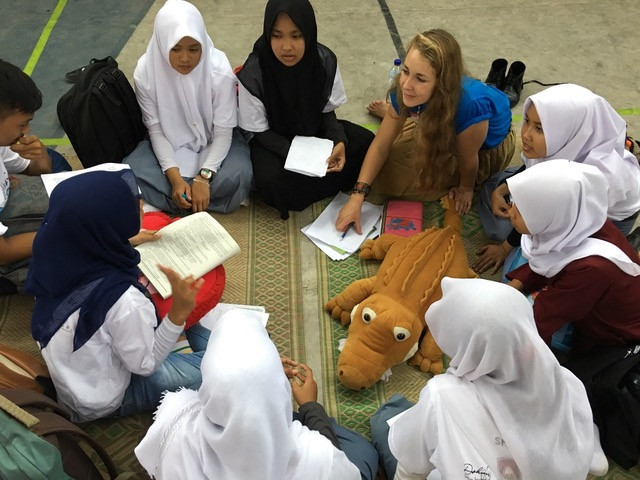Popular Reads
Top Results
Can't find what you're looking for?
View all search resultsPopular Reads
Top Results
Can't find what you're looking for?
View all search resultsGoing beyond awareness: Dahuni takes on cyberbullying via interactive platform
A new initiative under development is creating a platform that will arm social media users with the tactics and tools necessary to respond to negative comments; and in doing so, combat the online scourge of cyberbullying, one response at a time.
Change text size
Gift Premium Articles
to Anyone
O
n Sept. 4, politician Panca Cipta Laksana of the Democratic Party tweeted, “The thighs of a South Tangerang deputy mayor candidate are so smooth”, on his personal Twitter account (@Panca66).
While Panca did not mention the candidate by name, most Twitter users believed he was referring to Rahayu Saraswati Djojohadikusumo, a Gerindra politician running for deputy mayor of South Tangerang who had recently posted photos of herself running in a pair of jogging shorts to her Instagram account.
Panca’s tweet sparked loads of misogynistic and lewd comments aimed at Rahayu, who responded promptly that she would not tolerate sexual harassment from anyone. Panca later apologized and deleted the offending tweet, but the damage to Rahayu had been done.
What happened to Rahayu is just one of the many examples on how cyberbullying, in the form of harassment among others, has become part of the internet culture in social media.
As Internet penetration increases in Indonesia, more and more people are transitioning to the digital sphere and creating social media accounts. And social media is the new, wide wild west, where people who often don’t know each other can interact more easily than ever before. While this influx of interaction can offer many positives, it is also proving a breeding ground for ill-intentioned communication from hate speech to cyberbullying.
Seeing the potential dangers of online hate and cyberbullying spilling over into real life, Dahuni Foundation has stepped up to the plate with “From Insult to Empathy and Empowerment”, an online platform to combat cyberbullying by teaching users how to respond to negative comments.
The educational foundation surveyed over 1,300 Indonesian internet users and found that more than 51 percent of the respondents had received negative comments online that caused them everything from mild annoyance to severe mental health issues.
The percentage is expected to grow even higher in line with a 40 percent rise in social media usage in Indonesia during COVID-19 restrictions. The figure reveals an unprecedented inflation among the country’s netizens engaging with digital content and in online interactions.
Inspired by complaints about cyberbullying from the foundation’s volunteers, Dahuni founder and director Riyani Indriyati came to the realization that there was an urgent need for more active support beyond the public awareness campaigns of the past.
Riyani Indriyati, the founder and director of the Dahuni Foundation (Dahuni Foundation/-)“Cyberbullying campaigns have been around for some time, but they only work on the surface where they spread awareness, [and] we feel that there hasn’t been any real action nowadays,” Riyani said.
“So what we’re trying to do is to extend that movement and make a platform where both social media users and experts on bullying can come together and put all these theories into practice,"
“At the end of the day, it’s one thing to raise awareness [and talk about it], but the users are the ones who [must] be able to implement and use all these tactics and tools when they face negative comments,” she stressed
The lack of formal education on responsible social media use in Indonesian schools has also led to a poor understanding of online etiquette in the younger demographic.
From respondents who had experienced cyberbullying, the Dahuni survey found that over 43 percent had received negative comments from unknown sources and 57 percent of the victims opted to remain silent instead of responding to the insults.
The survey report revealed that lacking the motivation to respond, avoiding conflict and skirting debate contributed to creating toxic online environments where bullies felt they were immune to the consequences a real-life confrontation would incur.
Riyani explained that most people did not have somewhere to go for help, and hoped that the new platform would help users feel empowered to respond and understand the possible motives behind the comments from their online bullies.
“People typically don’t feel they have the power or access to report [cyberbullying] or go to the police when they receive hateful comments. But they do have the power to stand up for themselves, and that’s what we’re trying to do: empower these individuals,” said Riyani.
More broadly, she muses that perhaps the collectivist nature of traditional Indonesian culture may play a role in the way victims react to hateful comments.
“We are a society where being independent and being alone is not always perceived as something positive,” she said.
The “From Insult to Empathy and Empowerment” initiative, which is still in the research and development stage, is currently available online as an Instagram campaign as well as through a series of offline programs for those who need somewhere to turn to.
Riyani expressed hope that the initiative would be a step forward in inspiring other movements, and that it would help highlight the significance and severity of cyberbullying in Indonesia.
“We’re not pretending that we can solve the whole cyberbullying issue. This is a complex issue, but I think that we all have played a role in shaping it into what it is now,” she said.












